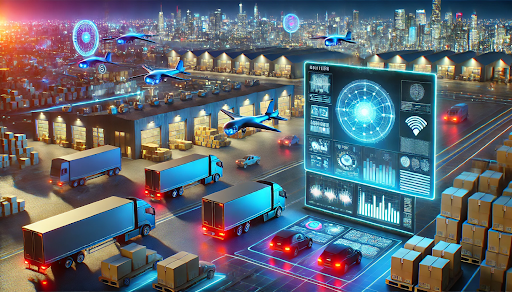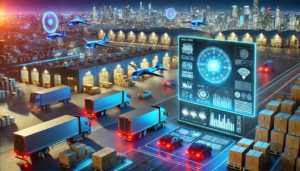
The logistics industry has undergone a significant transformation over the past decade, and the pace of change is accelerating. Gone are the days of manual tracking, paper-based records, and endless phone calls to coordinate shipments. The rise of logistics apps has revolutionized how businesses operate, offering streamlined processes, improved efficiency, and real-time tracking capabilities.
With increasing demand for faster deliveries, optimized supply chains, and cost-effective operations, businesses are turning to mobile app development services to create cutting-edge logistics solutions. These apps not only improve customer experience but also provide businesses with actionable insights and data-driven decision-making capabilities. In this blog, we explore the impact of logistics apps, their key features, and what the future holds for this fast-evolving industry.
The Rise of Logistics Apps
The global shift toward digitalization has given rise to logistics applications that help businesses streamline their supply chain operations. Companies of all sizes are now leveraging mobile technology to optimize transportation, track shipments, and enhance customer satisfaction.
Logistics apps provide real-time tracking and predictive analytics, allowing companies to make data-driven decisions. With AI-powered route optimization and automated scheduling, businesses can reduce costs and improve efficiency. These apps also facilitate seamless communication between drivers, warehouse managers, and customers, ensuring that logistics processes run smoothly from start to finish.
Key Features of Modern Logistics Apps
Modern logistics apps come packed with features that redefine how businesses handle transportation and supply chain management. Here are some essential functionalities that make these apps indispensable:
- Real-Time Tracking: Businesses and customers can track shipments in real time, reducing uncertainty and improving transparency.
- Automated Dispatch and Route Optimization: AI-driven algorithms help determine the most efficient delivery routes, reducing fuel consumption and delivery times.
- Warehouse Management: Inventory tracking and stock level management are streamlined through digital platforms, minimizing errors and improving accuracy.
- Digital Documentation and E-Signatures: Paperless transactions speed up operations and reduce the risk of document misplacement.
- Predictive Analytics: AI and machine learning help forecast demand, allowing businesses to plan resources effectively.
- Seamless Communication: Drivers, dispatchers, and customers stay connected through instant messaging and notifications.
By integrating these features, companies that invest in mobile app development services gain a competitive edge in logistics management.
How Logistics Apps Improve Efficiency and Cost Savings
Efficiency and cost reduction are at the heart of every business operation, and logistics apps play a crucial role in achieving these goals. By automating processes and reducing human intervention, these apps minimize errors, saving both time and money.
For example, real-time route optimization ensures that drivers take the most efficient paths, reducing fuel consumption and improving delivery speed. Automated scheduling minimizes downtime, ensuring that vehicles are always in use. Additionally, predictive analytics help businesses avoid overstocking or understocking, reducing storage costs and preventing wastage.
Enhancing Customer Experience Through Logistics Apps
In today’s competitive market, customer satisfaction is a key differentiator. Logistics apps enhance the customer experience by offering real-time updates, transparent pricing, and easy tracking options. These features build trust and ensure that customers remain informed throughout the shipping process.
Additionally, features like contactless delivery and AI-driven chat support provide a seamless user experience. By offering personalized delivery options and faster processing times, businesses can strengthen customer relationships and increase brand loyalty.
The Role of AI and IoT in Logistics App Development
Artificial Intelligence (AI) and the Internet of Things (IoT) are two technological advancements that have reshaped logistics app development. AI enhances route optimization, demand forecasting, and predictive maintenance, while IoT enables smart tracking and automated monitoring of goods in transit.
For instance, IoT-enabled sensors allow businesses to monitor temperature-sensitive shipments, ensuring that perishable goods remain in optimal conditions. AI-driven chatbots provide instant customer support, addressing inquiries efficiently. These innovations make logistics apps more intelligent, helping businesses operate with precision and agility.
The Future of Logistics Apps
The future of logistics apps is driven by continuous innovation and technological advancements. As businesses demand faster deliveries and better automation, logistics apps will evolve to include even more sophisticated features.
One emerging trend is the use of blockchain technology for enhanced security and transparency in supply chains. Blockchain-powered smart contracts ensure that transactions are immutable and verifiable, reducing fraud and improving trust. Additionally, autonomous vehicles and drones will revolutionize last-mile deliveries, further streamlining logistics operations.
Choosing the Right Mobile App Development Services for Logistics
With the increasing demand for logistics apps, businesses must partner with experienced mobile app development services to create tailored solutions. The right development team will understand the specific needs of the logistics industry and incorporate cutting-edge technology to enhance efficiency.
Key factors to consider when selecting a development service include experience, expertise in AI and IoT integration, scalability, and post-launch support. Investing in high-quality development ensures that businesses stay ahead in the competitive logistics landscape.
Conclusion
The logistics industry is evolving at an unprecedented pace, and businesses must adapt to stay relevant. Logistics apps have transformed the way companies manage their supply chains, offering improved efficiency, cost savings, and enhanced customer experiences.
By leveraging the power of AI, IoT, and blockchain, businesses can future-proof their logistics operations and gain a competitive advantage. The future of logistics is digital, and companies that embrace innovation will thrive in this rapidly changing landscape.








